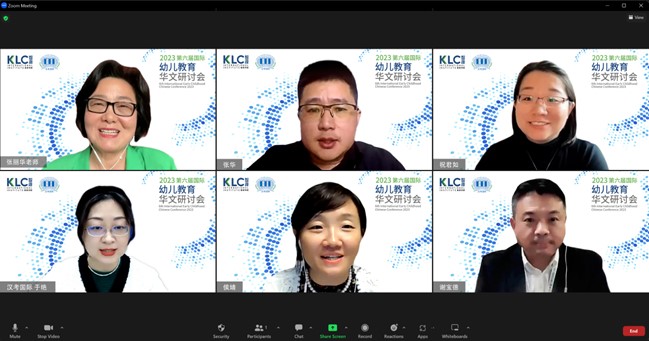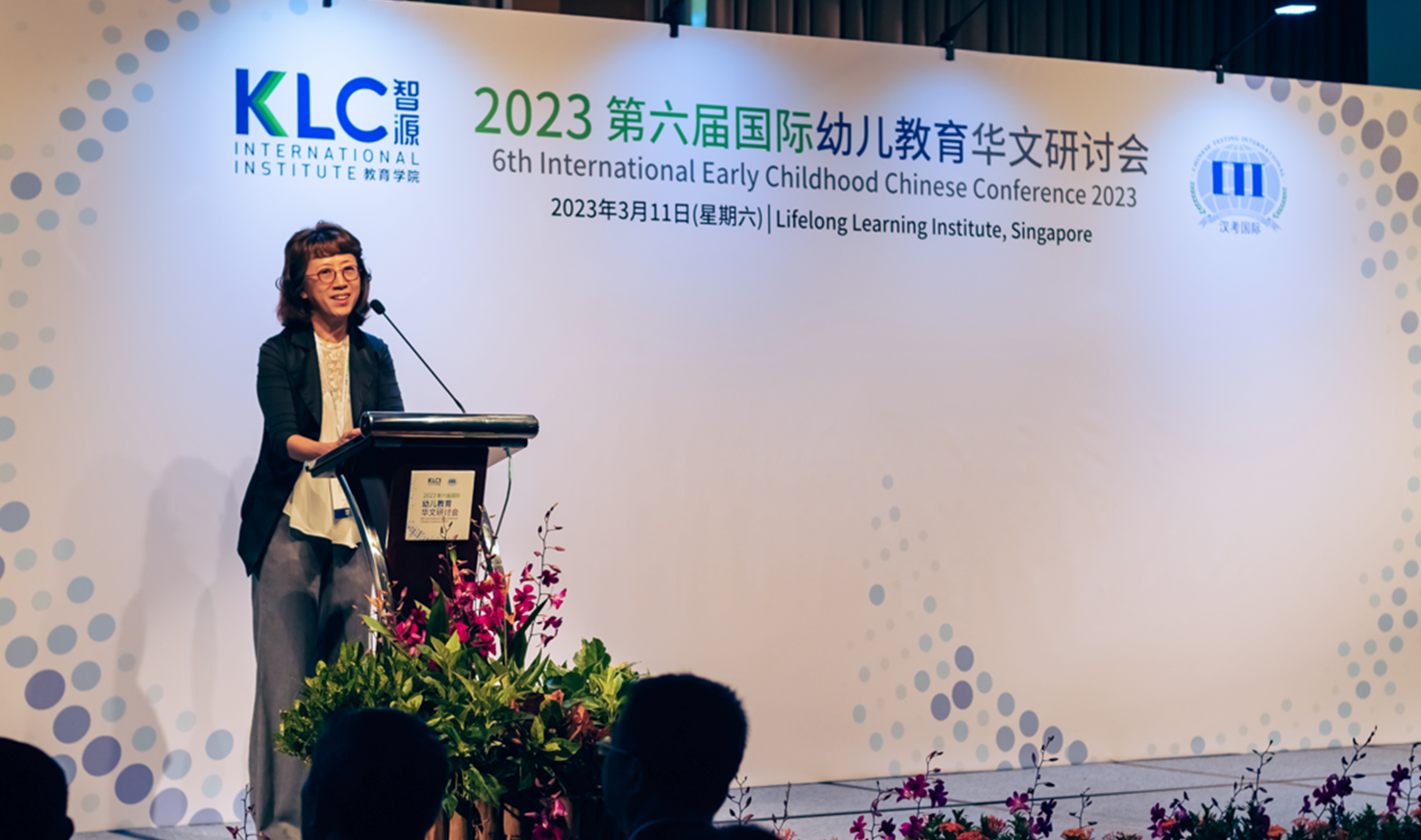Digitalisation, propelled by technology advances in the Internet, big data, cloud computing and artificial intelligence, is having a profound impact on education reform. There are great opportunities but also immense challenges for early childhood Chinese language educators wanting to leverage on and integrate new digital technologies into their work. Close to 400 early childhood (EC) educators attended the 6th International Early Childhood Chinese Conference 2023 to gain new insights into how best to harness digital technology for both work and professional development.

KLCII Early Childhood Chinese Conference held at Lifelong Learning Institute
In his welcome address, KLCII’s CEO and Principal, Mr Chua Ying Hwee, highlighted the importance of reimagination, continual adoption of new technologies and upskilling to stay relevant in the rapidly changing education environment. He shared how KLCII had in 2019 taken major steps to digitalise operations and automate processes to successfully transform its business.
Through the pandemic, KLCII has not only maintained its edge in preschool educator training, it has also expanded into providing business transformation consultancy services and training courses. This year’s conference was designed to expose early childhood educators to new ways of thinking and help everyone keep pace with changes in the world, bringing new ideas to improve Chinese language teaching in preschools.

KLCII CEO/Principal Mr Chua Ying Hwee giving the opening address on stage
Four keynote speakers and eight workshop presenters, comprising international thought leaders, EC experts and practitioners, were featured in the day-long conference. They offered preschool Chinese language educators fresh insights on how they could embrace digital technologies for their professional growth by integrating them into their pedagogical practice.
The keynote speakers included:
1) Mr Liang Chun Xiao, Former Senior Researcher (Vice President) of Alibaba Group and Director of Ali Research Center, and Executive Director of E-Commerce Committee of China Information Economics Association
Mr Liang shared the transformative impact of the digital age on education and the importance of foresight in shaping the future of learning. It is necessary for educators to leverage new technologies, foster imagination and creativity, and dream of the future beyond tomorrow’s world to ensure that education remains relevant and effective in tomorrow’s society. Educators must be open to share and learn across disciplines, adapt to broader societal changes wrought by new technologies and acquire new skills and knowledge to stay relevant.

2. Professor Yu Yong Ping, doctoral supervisor at the School of Education Sciences, Nanjing Normal University, and Chairman of the China Preschool Education Research Association
At the event, Professor Yu emphasized the importance of integrating local culture and social environment into the kindergarten curriculum. This approach enhances children’s learning and development, promotes cultural preservation and instils a sense of pride in their heritage. Educators must have broad vision, the ability to innovate, and a deep understanding of the local context to develop curriculum that will meet the needs of young children and create an engaging learning environment.

3. Dr. Li Peize, Chairman and General Manager of Hankao International Education Technology (Beijing) Co., Ltd,
In Dr. Li’s speech, he addressed the alignment between Chinese Language education and Early Childhood education, as well as the opportunities and challenges that digitalisation brings to both fields. The digital age offers numerous opportunities, including access to a wide range of educational resources, personalized learning experiences, and the ability to connect and collaborate with learners and educators from around the world. The digital age also offers new opportunities to improve teaching and learning methods, broaden education horizons, and foster global awareness and understanding.

4. Mdm Xiong Hua Li, Director of the English-Chinese Bilingual Programme at the Canadian International School in Singapore
Mdm Xiong’s presentation highlighted the difficulties faced in offering Chinese Language courses in international schools due to students’ coming from diverse language backgrounds and the dominance of the English Language. Despite challenges, she shared on how Canadian International Schools have met these challenges through targeted curriculum development, textbook selection, and effective teacher management strategies.

The eight workshops were conducted by experts from China, Singapore, Thailand and the United States. Out of the 8 workshops, 4 were conducted online and 4 on-site. The topics covered included:
Physical workshops
- Impact of Digital Platforms on International Preschool Chinese Language Teaching
- The Use of Digital Technology in Inclusive Education Programme (using UDL) for Children
- The Impact of Technology on International School Chinese Language Learning
- Application of Project-based Learning (PBL) in the Chinese Classroom

Clockwise from top left: Ms Tian Qian, Chinese Language teacher at Canadian International School; Mr James Ling, Head Chinese Language Learning; Dr Feng Yu Shan, Head of Mother Tongue Department of United World College of South East Asia; Mr Wang Jian Qiang, IB and IGCSE teacher of Hwa Chong International School
Online workshops
- Importance of Bilingual Learning in a Multicultural Society
- Preschool Industry Transformation Opportunities through Big Data
- The Influence of Modern Technology on Preschool Chinese Learning in Thailand
- International Skills Standards for Chinese Preschool Language Teaching

Clockwise from left: Ms Zhang Li Hua, Chinese Language Teacher of Brookline High School, Massachusetts, USA; Mr Zhang Hua, Founder of the Childcare Circle Platform; Ms Zhu Jun Ru, Chinese Language Teacher of International School in Thailand; Ms Yu Yan, Director of Curriculum and Pedagogy of Chinese Testing International Co., Ltd., Peking, China; Ms Hou Jing, Assistant Head, KLCII Early Childhood Chinese Programmes; Mr Desmond Seah, VP Business Development, KLC International Institute
Dr. Chen Shi, KLC International Institute Vice Principal, concluded and shared her thoughts on the Conference. She emphasized the significance of cross-disciplinary collisions and expanded thinking in driving the advancement of Chinese Early Childhood education. She also expressed heartfelt appreciation to the speakers from diverse backgrounds, including the United States, Thailand and China, for their invaluable contributions to the Conference. Their precise understanding of the digital era and seamless integration with the theme added immeasurable value to the event. Looking ahead, Dr Chen Shi highlighted that KLC International Institute will focus on innovative learning and development to support preschool operations and business transformation.

Dr Chen Shi giving a closing speech
